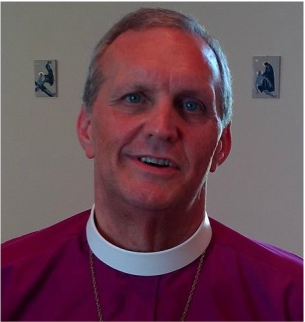Greetings of God's peace!
Over the past year I have great privilege to work alongside a steering committee of three other bishops of various churches. Our goal together has been to call forth the "Catholic Bishops' Forum" (CBF), an association of various Catholic Churches who identify themselves as independent Catholic or Old Catholic. In our work, we labored to understand what kind of churches we were calling forth for the Forum. While, we wanted to be be the "good guys" and invite everyone, but we knew that was not a healthy or reasonable approach. After numerous conversations together, the steering committee arrived upon a way to think about unity across the churches as a backdrop to our invitations for other bishops to join in this venture with us. Our chair, Bishop Francis Krebs (Ecumenical Catholic Communion) put our thoughts to paper in this brief statement which follows:
"In Essentials, Unity; in Doubtful Matters, Liberty; in All Things, Charity."
John XXIII's first encyclical, Ad Petri Cathedram of 1959 included this famous quote but did not attribute it to anyone in particular. “But the common saying, expressed in various ways and attributed to various authors, must be recalled with approval: in essentials, unity; in doubtful matters, liberty; in all things, charity.” (paragraph 72)
Differentiated Consensus
The following is excerpted from The Church and Ecclesial Communion, Report of the International Roman Catholic-Old Catholic Dialogue Commission (12/5/2009). It explains how the above ancient maxim can be applied practically in dialogue.
6.1 On the method of differentiated consensus
(34) The wide-ranging consensus in the understanding and confession of the traditional catholic faith established here (cf. 26 above) was worked through methodologically according to the more recent principles of ecumenical hermeneutics. These principles are founded on the recognition that the sought-for unity in the faith does not mean uniformity, but rather a diversity in which any remaining differences beyond the fundamental consensus are not accorded church-dividing force. Accordingly the goal of dialogue is not doctrinal consensus in the form of congruence, but a differentiated consensus consisting of two components which are to be differentiated from one another:
The Chicago Lambeth Quadrilateral is a statement of the four Anglican essentials for a reunited Christian Church. It concerns:
This is a term our CBF steering committee came up with to single out essential features of being Catholic mentioned in the document Uppsala and Utrecht which paved the way to full communion between the Union of Utrecht and the Church of Sweden in 2013. While these features do not exhaust the profound Old Catholic sense of “Catholicity,” these features do show a remarkable similarity of the Quadrilateral with the addition of the conciliar nature of the Church.
With these ways of thinking about unity, in perhaps a new way as Church, we were pleased that sixteen bishops of eight jurisdictions of various independent or Old Catholic churches were able to come together in October 2018 to deepen our friendships with one another, to share our fears and dreams of coming together, and to begin to collaborate on areas of mutual concern. What a marvelous gift of the Holy Spirit! When we rely upon the gift of the tradition of our common Faith we can do great and wonderful things together and know God's peace deep within. These same "hinges" are very much our own identity as Diocese. These affirm and empower our Catholic identity as well as strengthen our confidence before others who question "What kind of Catholic are you?" Let the door swing wide open to include all God's children as we proclaim the Holy Gospel in a world called to be divinized in Christ.
God be your strength and joy in your journey of faith in community!
[i] “As the Roman Catholic Church still determines the image of Catholic Christianity in the public consciousness, the use of the term “catholic” requires explanation. When the word is used without further qualification, it is here a phenomenological description referring to a number of aspects of theology and life which are shared by a number of churches, for example a desire to be in continuity with the church through the ages, the role of sacraments and liturgical worship, the presence of episcopal ministry etc.” [emphasis mine] Source: Utrecht and Uppsala on the Way to Communion, report from the official dialogue between the Old Catholic Churches of the Union of Utrecht and the Church of Sweden, 2013, p. 6
“Episcopacy is part of the threefold apostolic ministry: bishop, presbyter (usually called priest) and deacon. This internal differentiation of the one (ordained) ministry is the outcome of developments in the first two or three centuries of the church. Though Old Catholics acknowledge the fact that this ministry underwent great fluctuations in the course of history, it is considered to be as binding as the canon of Holy Scripture, the creeds of the ancient church (ie.the Niceno-Constantinopolitan as well as the Apostolic) and the nascent conciliar system of common witness and decision-making of the church” [referred to often as synodality].
Over the past year I have great privilege to work alongside a steering committee of three other bishops of various churches. Our goal together has been to call forth the "Catholic Bishops' Forum" (CBF), an association of various Catholic Churches who identify themselves as independent Catholic or Old Catholic. In our work, we labored to understand what kind of churches we were calling forth for the Forum. While, we wanted to be be the "good guys" and invite everyone, but we knew that was not a healthy or reasonable approach. After numerous conversations together, the steering committee arrived upon a way to think about unity across the churches as a backdrop to our invitations for other bishops to join in this venture with us. Our chair, Bishop Francis Krebs (Ecumenical Catholic Communion) put our thoughts to paper in this brief statement which follows:
"In Essentials, Unity; in Doubtful Matters, Liberty; in All Things, Charity."
John XXIII's first encyclical, Ad Petri Cathedram of 1959 included this famous quote but did not attribute it to anyone in particular. “But the common saying, expressed in various ways and attributed to various authors, must be recalled with approval: in essentials, unity; in doubtful matters, liberty; in all things, charity.” (paragraph 72)
Differentiated Consensus
The following is excerpted from The Church and Ecclesial Communion, Report of the International Roman Catholic-Old Catholic Dialogue Commission (12/5/2009). It explains how the above ancient maxim can be applied practically in dialogue.
6.1 On the method of differentiated consensus
(34) The wide-ranging consensus in the understanding and confession of the traditional catholic faith established here (cf. 26 above) was worked through methodologically according to the more recent principles of ecumenical hermeneutics. These principles are founded on the recognition that the sought-for unity in the faith does not mean uniformity, but rather a diversity in which any remaining differences beyond the fundamental consensus are not accorded church-dividing force. Accordingly the goal of dialogue is not doctrinal consensus in the form of congruence, but a differentiated consensus consisting of two components which are to be differentiated from one another:
- A clear statement on the consensus reached in the fundamental and essential content of a previously controversial doctrine.
- A declaration that and why the remaining doctrinal differences, which are also to be clearly named, can be considered admissible and thus do not call into question the consensus in the fundamentals and essentials.
The Chicago Lambeth Quadrilateral is a statement of the four Anglican essentials for a reunited Christian Church. It concerns:
- the Scriptures,
- Creeds,
- Sacraments,
- and the historic Episcopate.
This is a term our CBF steering committee came up with to single out essential features of being Catholic mentioned in the document Uppsala and Utrecht which paved the way to full communion between the Union of Utrecht and the Church of Sweden in 2013. While these features do not exhaust the profound Old Catholic sense of “Catholicity,” these features do show a remarkable similarity of the Quadrilateral with the addition of the conciliar nature of the Church.
- The Sacred Scriptures
- The Creeds
- The Sacraments and liturgical worship
- The threefold Apostolic Ministry: bishop, presbyter, and deacon
- Synodality
With these ways of thinking about unity, in perhaps a new way as Church, we were pleased that sixteen bishops of eight jurisdictions of various independent or Old Catholic churches were able to come together in October 2018 to deepen our friendships with one another, to share our fears and dreams of coming together, and to begin to collaborate on areas of mutual concern. What a marvelous gift of the Holy Spirit! When we rely upon the gift of the tradition of our common Faith we can do great and wonderful things together and know God's peace deep within. These same "hinges" are very much our own identity as Diocese. These affirm and empower our Catholic identity as well as strengthen our confidence before others who question "What kind of Catholic are you?" Let the door swing wide open to include all God's children as we proclaim the Holy Gospel in a world called to be divinized in Christ.
God be your strength and joy in your journey of faith in community!
[i] “As the Roman Catholic Church still determines the image of Catholic Christianity in the public consciousness, the use of the term “catholic” requires explanation. When the word is used without further qualification, it is here a phenomenological description referring to a number of aspects of theology and life which are shared by a number of churches, for example a desire to be in continuity with the church through the ages, the role of sacraments and liturgical worship, the presence of episcopal ministry etc.” [emphasis mine] Source: Utrecht and Uppsala on the Way to Communion, report from the official dialogue between the Old Catholic Churches of the Union of Utrecht and the Church of Sweden, 2013, p. 6
“Episcopacy is part of the threefold apostolic ministry: bishop, presbyter (usually called priest) and deacon. This internal differentiation of the one (ordained) ministry is the outcome of developments in the first two or three centuries of the church. Though Old Catholics acknowledge the fact that this ministry underwent great fluctuations in the course of history, it is considered to be as binding as the canon of Holy Scripture, the creeds of the ancient church (ie.the Niceno-Constantinopolitan as well as the Apostolic) and the nascent conciliar system of common witness and decision-making of the church” [referred to often as synodality].


 RSS Feed
RSS Feed